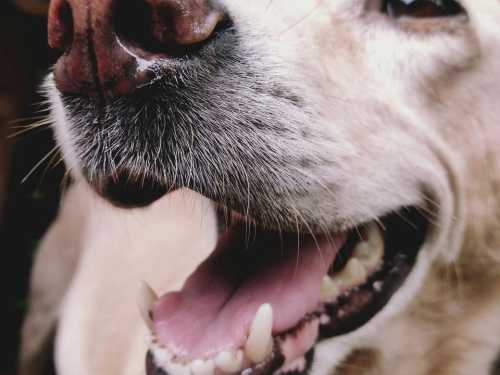
Many people think that bad breath in dogs (halitosis) is as common as a wagging tail. However, this is not at all true. The appearance of a bad smell can be a sign of diseases of the oral cavity and internal organs.
Health problems associated with halitosis
Pets can't tell you for sure if their bodies are healthy. That's why it's so important to monitor even the slightest changes in their health. Bad breath in dogs can be a sign of serious problems.
Incorrect or insufficient brushing of teeth can lead to the accumulation of plaque and tartar, which later causes serious problems. Bad breath is most often the result of diseases of the oral mucosa, gums or ligaments of the teeth, such as gingivitis and periodontitis. Let's take a closer look at each of these ailments.
Gingivitis in dogs
Gingivitis is quite common in dogs, with over 80% of pets over the age of three being affected. Miniature breeds of dogs, such as Chihuahuas, are at an earlier risk of developing gingivitis.
Maintaining good oral hygiene will help prevent gingivitis, but if the disease is allowed to develop, it can progress to periodontal disease.
Periodontal disease in dogs
Periodontal disease is a disease of the tissues surrounding the teeth: the gums and jawbones, which, as it progresses, can affect the bone tissue that surrounds and supports the teeth.
Such diseases are caused by the formation of periodontal pockets and the accumulation of bacteria in them, which is the first one of the phases of the development of periodontal disease.
Susceptibility to periodontal disease depends on a number of factors, including the dog's breed, bite, chewing, and biting on hard objects.
If you are unsure about your pet's health, please consult a veterinarian.
Other causes of halitosis
In addition to oral problems, halitosis can be caused by other diseases. These include:
- respiratory infections;
- renal failure;
- pancreatitis (pancreatic dysfunction), gastritis, intestinal parasites and other diseases of the gastrointestinal tract;
- diabetes;
- oncology.
The symptom can also be caused by inflammation of the mucous membrane of the mouth or nasopharynx, tartar and other dental problems. In puppies, this may be due to a change in teeth. Baby teeth do not always fall out on their own: sometimes the roots begin to press on them from below. This damages the gums, and inflammation begins, which can only be noticed by an unpleasant odor from the mouth.
Depending on the cause of the odor, the unpleasant odor may have characteristic features. For example, with kidney problems, the owner may smell urine that enters the animal's blood. It also resembles the smell of ammonia. With diabetes, the smell of acetone may appear, and with oncology, a sweetish-putrid odor.
Prevention measures
If you take care of your pet's health, you can avoid serious disorders. The main method of prevention at home is oral hygiene. At least twice a week, you should brush your teeth with a special brush and toothpaste.
Dog toothpaste helps remove plaque and prevents tartar buildup. It contains flavorings, which is why pets like it.
A puppy should be taught to brush their teeth from an early age. This will help form the habit, and in the future the dog will tolerate the procedure calmly.
In addition to brushing, it is worth giving your pet chew toys and special cleaning treats. There are also foods that prevent the formation of plaque.
Another mandatory method of prevention is regular visits to the veterinary clinic. Visit a veterinarian-therapist and a veterinarian-dentist separately. The first can check the general condition, give vaccinations, and treat for parasites. The second will tell you for sure whether everything is fine with the oral cavity.
Routine check-ups help diagnose a problem at an early stage: for example, spotting tartar that has not yet developed into gingivitis. Tartar cannot be removed at home, and the dentist will prescribe an ultrasonic cleaning in the clinic under anesthesia.
If you notice an unpleasant odor coming from your dog's mouth, you should make an appointment with your veterinarian immediately. This is especially important if it smells like urine or acetone – in such situations, every day is precious. But even in the case of gingivitis, you need to act quickly to prevent it from developing into periodontitis and restore your dog's well-being.





